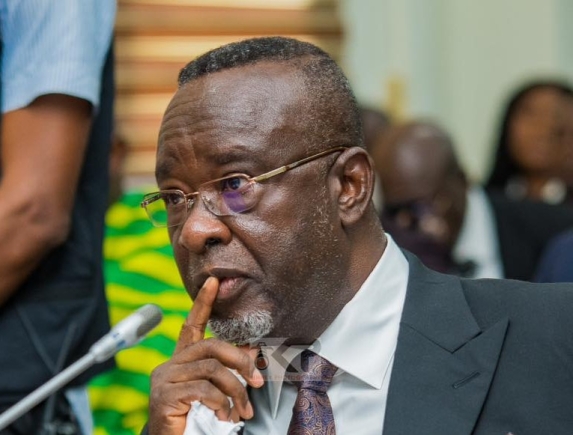
Justice Baffoe-Bonnie: Ghana needs Judiciary that do not just interpret law, but capable of elevating conscience
Chief Justice nominee, Justice Paul Baffoe-Bonnie, has pledged to renew the Judiciary’s brand by leading an administration that prioritises greater transparency, efficiency and accessibility.
Appearing before the vetting committee of Parliament on Monday, he said the nation needed a Judiciary that did not just interpret the law, but capable of elevating its conscience.
At the vetting preceded by more than a three-hour standoff over procedure and arguments, and eventual boycott by the Minority in Parliament, the Chief Justice nominee passed judgement on his own vetting, saying the event was a constitutional duty that could not be shelved.
Justice Baffoe-Bonnie added that when approved, he would ensure that the Judiciary would work, not as a political actor, but as a guardian of rights, checks and a final arbiter of rule of law.
“If confirmed, I will stand with every judge, staff, court user and citizen in the belief that access to justice should not depend on who you are or your connections,” he said.
He told the committee that integrity and honesty were his utmost values, adding that this had been evident in his life and career journey.
“It does not matter who you are; once it comes to the law, it is no discriminator of persons. That has been my lifestyle, and if anybody is to go through my file, this is what he will come up with,” Justice Baffoe-Bonnie, who has been on the Supreme Court bench for the past 18 years, stated.
By-partisan
Addressing concerns about his nomination, Justice Baffoe-Bonnie downplayed suggestions that it was a reward for his role in the 2012 election petition, stating, "I wouldn't know what goes on in the President's mind”.
He reflected on his extensive experience, saying that his career trajectory had been shaped by various administrations, demonstrating his bipartisan appeal.
To support this, he recounted how former President Jerry John Rawlings appointed him to the bench as a Circuit Court judge, with John Agyekum Kufuor elevating him to the Court of Appeal.
When questioned about the duration of presidential election challenges, he acknowledged the need for reform to ensure these matters were resolved before the inauguration.
He cited the lengthy 2012 election petition process as a significant drawback and proposed changes to streamline the electoral dispute resolution process, suggesting that elections could be held earlier in November to facilitate timely outcomes.
Justice Baffoe-Bonnie also discussed the introduction of a career magistrate programme to address staffing shortages in district courts.
He pointed out that many current judges were not adequately prepared to fill these roles and stressed the importance of proper remuneration to attract qualified candidates.
Walk out
Before the vetting could proceed, the minority walked out of the committee room.
The Minority Leader, Alexander Afenyo-Markin, said given that the former Chief Justice had challenged the article 146 committee’s findings.
He also accused the Majority of denying every opportunity to express their opinion, adding, “We, the minority caucus, vote to reject the nominee. We would want to state on record that the majority can proceed with the questions, we do not intend to proceed with any question, we are registering in the strongest steps”.
“We reject the nomination and the record should reflect that the report be a majority report. We cannot be part of a process that will give right to another and knight another of her bona fide,” he said.
Even before walking out, the house was temporarily adjourned over a tense session where the Minority and Majority Leaders clashed over the terminology used to describe Chief Justice nominee Justice Paul Baffoe-Bonnie, igniting a fierce debate in the vetting committee.
The use of the word “disputed nominee” by the Minority Leader to describe the Chief Justice nominee caused a clash between the Minority and the Majority side.
When he was given the opportunity to make a preliminary comment, the Minority Leader, Alexander Afenyo-Markin, described the acting Chief Justice as a “disputed nominee”, a term which the Majority Leader, Mahama Ayariga, objected to.
The Majority Leader’s argument was per Standing Orders 122 and 123, which guide the grounds on which debates can be interrupted and the content of speeches.
According to him, the first provision barred the Minority Leader from raising any new issues, especially when the Speaker had ruled on a motion filed by the Minority seeking to stay the vetting.
The second provision stipulates that the conduct of the Speaker, the Chief Justice, members, and the Superior Court of Judicature shall not be raised in Parliament except by a subordinate motion.
“He has no lawful authority to raise anything about what happened in court and on the floor of parliament,” the Majority Leader said.
In his response, the Minority Leader accused the Majority Leader of acting in bad faith, further accusing him of trying to use his numbers to intimidate the Minority.
He added that the rule relied on by the Majority Leader had to do with debates on the floor of the house.
Mr Afenyo-Markin further stated that the issue raised in his preliminary comment was a political issue, and as such, the Minority needed to be given the opportunity to express same.
He further went ahead to describe the work of the Justice Pwamang committee as a travesty of justice.
The Chairman of the Committee, Bernard Ahiafor, has adjourned proceedings temporarily to rule on the matter.
